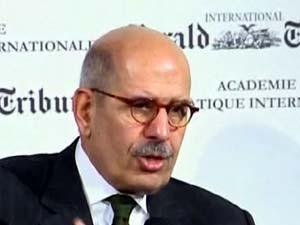 Heads and senior members of opposition parties have disgraced themselves by announcing that they are looking for suitable nominees for the next presidential elections in Egypt. Being a matter of urgency, the 'job advert' was published in the press, broadcast on different television channels, downloaded on Facebook and YouTube, and announced during mass rallies and meetings organised by the employer. Ordinary members of the public, even the unemployed, who have no interest in this particular job, have been urged to co-operate and nominate anyone they think has what it takes to run against the ruling party's candidate. It was disgraceful of the Egyptian opposition parties to emphasise to applicants that a political background and an intimate understanding of the nation's woes are by no means essential
Heads and senior members of opposition parties have disgraced themselves by announcing that they are looking for suitable nominees for the next presidential elections in Egypt. Being a matter of urgency, the 'job advert' was published in the press, broadcast on different television channels, downloaded on Facebook and YouTube, and announced during mass rallies and meetings organised by the employer. Ordinary members of the public, even the unemployed, who have no interest in this particular job, have been urged to co-operate and nominate anyone they think has what it takes to run against the ruling party's candidate. It was disgraceful of the Egyptian opposition parties to emphasise to applicants that a political background and an intimate understanding of the nation's woes are by no means essential
Moreover, desperate to persuade unemployed people to come forward and apply for the job, the opposition parties have been looking for presidential candidates overseas, among Egyptians, who live permanently in foreign countries and have foreign passports. They've been telling Egyptian expats not to hesitate but to go ahead and apply for the job, even if they last visited their homeland decades ago. The irony is that the employer should be represented by leaders of opposition parties, flamboyant politicians and high-profile thinkers, who are not ashamed to declare their support for the winning candidate. This extraordinary job offer has attracted the attention of two Egyptian scientists abroad: Mohamed el-Baradei, chief of the International Agency for Atomic Energy (IAAE), and Professor Ahmed Zowail. Both men are Nobel laureates and over the past few decades both have kept in touch with distant relatives in Egypt by phone. Both men are also believed to spend most of their time in the laboratory. While Prof. Zowail has turned down the opposition's offer because he's too busy at his university in the US, opposition chiefs and thinkers toasted el-Baradei when he said that he appreciated the idea of being the President of the Republic as a post-retirement job. Acting like a political leader, el-Baradei published a statement (an interview indeed) in the local press, in which he told his supporters at home that he is ready to pack his bags in Vienna and clear out his desk in the IAAE headquarters then fly home to Egypt. Overwhelmed by the thought of this post-retirement job, the opposition-chosen candidate, who doesn't know who runs what in the local political parties, has implied in his interviews in the Egyptian press that he would love to address mass rallies and discuss with the nation his presidential programme. This extraordinary 'job advert' has undermined the prestige of the leaders of the opposition parties. Their looking for an outsider to represent them in the forthcoming presidential race must surely imply that these opposition leaders are incompetent. By timidly refusing to run in the next presidential elections, these chiefs must have convinced their supporters that they are not even qualified for their current political responsibilities.



